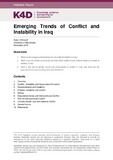Emerging Trends of Conflict and Instability in Iraq
Abstract
This rapid review synthesises literature from academic, policy and NGO sources on the emerging trends of conflict and instability at both the country and localised level in Iraq. The report utilises literature published after November 2017 in order to focus on the current dynamics – with the failed Kurdish referendum, government retaking control of the disputed territories, territorial defeat of the Islamic State (IS),1 the rising influence of militias, and the protest movement in the south of Iraq. Additionally, this report examines the role of gender norms and masculinities in conflict in Iraq, however the literature is very limited in this regard and thus a slightly larger timescale is utilised (literature published since 2014). This review uses literature that was published up until September 2018 and therefore it is important to note that this is the middle of negotiations to form the government, which involves a number of political deals. The situation in Iraq is rapidly evolving and this review has demonstrated the current position, however this can change depending on the government that is formed and the policies they develop to deal with a range of issues highlighted in this report, ranging from Kirkuk to the protests in the south. Although it has become increasingly unlikely that the Prime Minister (PM), Haider al-Abadi, will remain in power, all possibilities of government formation are included in this report, as per the literature. Community tensions and potential intercommunal conflict in Iraq may emerge over competition for resources as environmental and agricultural degradation, decrease of water resources, and historic lack of investment in infrastructure take its toll. Interconnected, displacement and migration are also likely to create tensions between communities, as well as competition over land and livelihoods of returnees post-IS. In the disputed territories, particularly Kirkuk, the lack of security provides the opportunity for intercommunal tensions to escalate over ownership, whilst the continued presence of militias also provides an opportunity for conflict. In wider Iraq the current government formation process is creating instability, whilst the protest movement has the potential to escalate, particularly as any new government will find it difficult to meet the protestors demands. The escalation of the protest movement has the potential to not only create conflict in the south – through the protestors and the government response – but also in the rest of the country as insecurity increases as a result.
Citation
O’Driscoll, D. (2018). Emerging Trends of Conflict and Instability in Iraq. K4D Helpdesk. Brighton, UK: Institute of Development Studies.Is part of series
K4D Helpdesk Report;433Rights holder
© DFID - Crown copyright 2018.Collections
- K4D [937]

